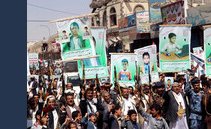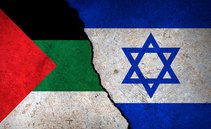The Hague did not force Israel into a ceasefire and the 2-state solution is the most popular, but what do the Palestinians want? The analysis of the teachers at the University of Roma Tre.

The land of Palestine continues to be stained with the blood of its people. More than three months after the events of October 7th, the genocide of the Palestinians continues amidst the indifference of a West increasingly stuck in its political immobilism, while Israel refuses any agreement for a ceasefire.
While the macabre count of Palestinian civilians killed continues (over 25 thousand), since October 7th a lot has been written and said on the military invasion and occupation of Palestine, on the historical and geographical areas of the conflict and possible future predictions.
It is for this reason that we decided to interview two experts on the subject, both professors at the Department of Humanistic Studies of the Roma Tre University: Professor Gennaro Gervasio, professor of History of Islamic Countries and History and politics of Middle East and North Africa, and Professor Gianfranco Bria lecturer in Islamic Law and Islam and Gender.
The dystopian media attention of the West: October 7th in the MENA area
October 7 was a media shock for the West, also shaped by the Israeli comparison as a new 9/11. Ultimately, it is too easy to reduce everything to that date, without taking into consideration at least the last 75 years of history and what role the most recent Abraham Accords have had. As Professor Gianfranco Bria told us, these are the consequences of a long-term colonial dynamic:
“Even today, with the Palestinian question, we are witnessing a long tailwind of a twentieth-century dynamic: colonialism. It had various stages: British domination, the great Arab revolts, the Nakba, the 6-day and Yom Kippur wars, the Suez crisis, the war in Lebanon... A whole series of episodes, wars, battles that ultimately led to a resurgence of the current situation”.
Not only the West, however, but also the Arab countries (the MENA area) had their role, especially in terms of exploitation of the Palestinian situation.
The intervention of the Arab countries, Egypt, Syria, Jordan, and Lebanon in its various factions, has never been decisive. Israel’s role in the October 7th attack is not a minor one. Bria explains how Israel, supported for various reasons by the United States, has had a repressive attitude towards the Palestinians and has exploited its formidable military power to consolidate its strength on the territory.
“It is a paradox because we are dealing with a colonial project, which is perfected the moment it normalizes - he continues - The Israeli colonial project, in the occupied territories, is no longer perceived as otherness by the inhabitants. In a certain sense, it was normalizing in the West Bank too, effectively relegating the situation of an ’open-air prison’ to Gaza, in which the living conditions (demographic density, management of resources in the hands of Israel, embargo of materials, etc) are inhumane.”
In the conditions of extreme crisis in the Gaza Strip, Hamas has proliferated.
According to Professor Gennaro Gervasio, however, both leaderships are in crisis: Prime Minister Netanyahu is once again at the center of attention for the corruption trial and is the least popular leader in the history of Israel; while the Islamic resistance movement of Hamas acted predictably to shake things up.
From Hamas’ point of view, Gervasio explains, the attack was a move to make clear to both enemies and friends that something still mattered and that the only real dissent came from them. “Now this is a propaganda move, but it should open a parenthesis on who the Palestinians are and who can decide their fate”, he concludes.
leggi anche
Who are the Houthi rebels and what do they want?

The Abraham Accords played a role in the normalization of relations, as they intended to bring Israel back into harmony with other countries in the MENA area, starting with Saudi Arabia.
“The international situation - as Professor Gervasio explained - once again short-sighted, had tried to cut off the Palestinians from the so-called "Abraham Accords". The formula, inaugurated in 1978 with Egypt, was designed to overcome Israel’s diplomatic isolation and make peace with its neighbors, but not with its main partner (Palestinians). Saudi Arabia and Israel were close to an agreement when Hamas brought the resistance movement and the situation in Gaza ("An open-air prison" to use the UN’s words) back into the spotlight".
The unsustainable comparison between Isis and Hamas: historical and practical differences of paramilitary organizations
One of the myths that has guided the Western narrative of the war in Palestine is the equation of Hamas with Isis (or Daesh). An unsustainable comparison but which is part of a clear media strategy - as explained by Professor Bria - functional to justify the massive military intervention in Gaza. The intent is to "dehumanize the opponent" by assimilating it into Daesh, without taking reality into account.
There are certainly points of contact between Isis and Hamas: “Both organizations respond to what is a modern, radical and literal rereading of Islam that finds no precedent in historical Islamic thought”. But the distances between the two are greater:
“Daesh was the bearer of a universal message, a transnational entity that called upon all the Muslims of the world – to found a Caliphate – Hamas, on the other hand, has a clear national vocation closely linked to the Palestinian question. Again: relationships with Christians. For Daesh, Christians were infidels to be exterminated, while for Hamas the relationship is different, so much so that many Palestinians living in Gaza are Christians".
Hamas - favored by the Rabbin’s government against Arafat’s PLO - is in turn an elaboration of the Muslim Brotherhood, "therefore of a communal Islam, engaged in social activities, providing services in an area like the Gaza Strip”. A national and social identity response that is poorly combined with the transnational interests of Daesh, often coming into conflict.
Therefore, Hamas is an extremely complex organization divided into factions, the so-called "hawks" and "doves", the first military, the second governmental. Then the unexpected happened: Hamas won the 2006 elections, becoming the only credible actor in the Gaza area. Despite this, "Hamas has always struggled to position itself as an interlocutor" and this is why in 2017 it attempted to present itself as a credible actor, with a statute in which it eliminated some radical elements to propose an opening.
After October 7th, however, everything was called into question. Perhaps we should ask ourselves whether October 7th was also the result of an international policy that has never accepted Hamas as an interlocutor at political decision-making tables. A question destined to remain unanswered.
The West is silent on genocide and does not foresee the cycle of revenge: what the future holds
As Gaza is razed to the ground, Western silence is striking. The West moved late, with too many deaths on its conscience and too many inconclusive requests for ceasefire. Yet, the countless pro-Palestinian protests tell a lot not only about the West, but above all about our governments: is it the fear of the different, of Islam, or is it historical and economic interests that guide the choices?
Much of the fear is not only relegated to what is happening in the Strip but also to what could happen tomorrow. Professor Gervasio talks about cycle of revenge in the short term. Unlike the world wars, even though the massacres were in the millions, cooperation was possible. As explained by Professor Gervasio:
“It doesn’t mean that it’s impossible, but the more you demonstrate that you don’t consider the other or don’t consider them at the same level (ed. note for example by dehumanizing the Palestinians with animal definitions or desacralizing their sacred places) the more it the tear to be mended will be large”
The terrorist risk in Europe and the United States, also in light of Western responsibilities, is lower than regional terrorism. According to Bria the Palestinian issue is a blow to the heart for all Muslims and "there could certainly be attacks. These are taken into account by the Western powers, who have developed increasingly pervasive and sophisticated intelligence apparatuses to block them."
leggi anche
Who is right between Israel and Palestine?

The (non) solution: for two peoples there are not two States
The obvious problem of the “two peoples - two states” solution is the historical Israeli attitude. If this had been possible, it would have been possible to maintain the division of the territories as had been decided. Behind the decision to colonize what remains of Palestinian living space, there are economic, but also cultural interests linked to Zionism. Proposing the "two peoples - two States" solution is therefore anachronistic and infeasible without a decolonization process.
“If you look at the map - explains Professor Gervasio - the solution is evident: the colonies are not colonies, they are cities with up to 40 thousand citizens. It is unthinkable that these colonies could be dismantled overnight."
So what is the most realistic solution? A plausible, perhaps unrealistic, option is the creation of a single state, anti-Zionist and based on democratic principles, without distinction of religion, ethnic identity, national origins, and citizenship status. This is the solution, conceived in the 1970s, of the binational state for all.
Original article published on Money.it Italy 2024-02-04 17:16:12. Original title: La guerra a Gaza spiegata, dalle ragioni dello scontro ai rischi per il futuro




